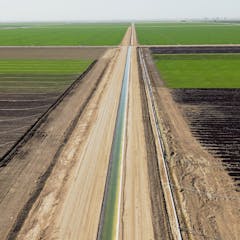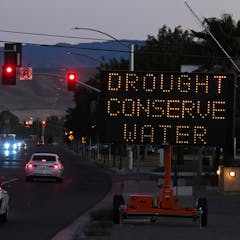
Articles on California
Displaying 21 - 40 of 280 articles

Forecasters warned of ‘potentially historic rainfall’ and ‘dangerous to locally catastrophic flooding.’ A hurricane scientist explains what El Niño, a heat dome and mountains have to do with the risk.

New findings from the La Brea Tar Pits in southern California suggest human-caused wildfires in the region, along with a warming climate, led to the loss of most of the area’s large mammals.

The law changed older adults’ caregiving behavior because their children became more able to take paid time off work to care for their own newborns.

Only 218 programs offer credit-bearing college programs in prison. That’s about to change.

An engineer who managed dams for years explains the tradeoffs operators make as they decide when to release water and how much to stay safe.

More extreme rainfall and frequent storms are raising the risk that floodwaters could spill over dams, or that dams could fail.

Nearly 22 million people lived within 3 miles of a US wildfire in the past two decades. A new study tracking their locations flips the script on who is at risk.

Southwest states have bought time with an agreement between California, Arizona and Nevada to cut Colorado River water use by about 14%. Now comes the hard part.

The Supreme Court has upheld a controversial California law requiring pork sold in-state to be humanely raised, no matter where it’s produced. Pork producers say it could drive up food prices.

Manufacturers don’t usually have to disclose what’s in products like shampoo and household cleaners, but a new study finds that these products can contain hazardous ingredients.

Fires here can affect meltwater timing and water quality, worsen erosion that triggers mudslides, and much more, as two scientists explain.

This year’s Sierra snowpack is looking a lot like 1983’s, and that was a year of flooding and mudslide disasters. A meteorologist explains what’s ahead.

Reservoirs and streams are in good shape in California and the Great Basin, but groundwater and ecosystems are another story. And then there’s the Colorado River Basin.

Rain falling on deep snow from a series of atmospheric rivers has heightened California’s flood risk. It’s a growing problem as the planet warms.

The drugmaker’s move responded to the growing competition that has shaken up the insulin market in recent years.

An environmental health lawyer explains why some states have weaker rules than others, and how you can make your concerns heard.

Most Americans knew the late Dianne Feinstein as a US senator. But for San Francisco voters, she will forever be remembered as the woman who stepped in at a tragic moment to lead the city.

Turkey has repeatedly attempted to improve its earthquake preparedness. So what went wrong?

Even after January’s storms, California faces a water-scarce future. An economist and an engineer propose a way to test higher water prices as a conservation strategy without hurting low-income users.

More homes are burning in wildfires in nearly every Western state. The reason? Humans.
